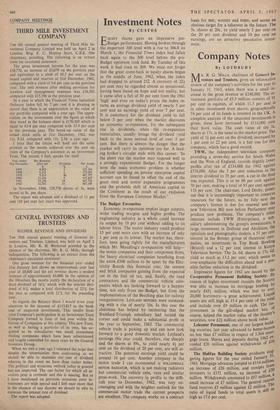Investment Notes
By CUSTOS
EQUITY shares gave an impressive pre- Budget performance. Having broken through the important 300 level with a rise to 306.8 on March 1, the Financial Times index had fallen back again to the 300 level before the pre- Budget optimism took hold. By Tuesday of this week it had risen to 309. We must not forget that the great come-back in equity shares began in the middle of June, 1962, when the index had dropped to around 252. A recovery of 221 per cent may be regarded almost as sensational, having been based on hope and not reality, but it came after a fall of 30 per cent from the 1961 'high' and even on today's prices the index re- turns an average dividend yield of nearly 5 per cent and an earnings yield of over 7 per cent. It is customary for the dividend yield to fall below 5 per cent when the market discounts an economic re-expansion, for the subsequent rise in dividends, when the re-expansion materialises, usually brings the dividend yield back to the more normal level of over 5 per cent. But there is always the danger that the market will carry its optimism too far. A lead- ing broker's circular ends with this caveat: 'In the short run the market may respond well to a strongly expansionist Budget. For the longer term the main economic problem is whether sufficient spending on private enterprise capital account can be found to offset the end of the great steel and motor expansion programmes and the probable shift of American capital to the Continent as the result of our exclusion from the European Common Market.'
The Budget Favourites Economic re-expansion implies larger outputs, wider trading margins and higher profits. The engineering industry as a whole could increase its output by 10 per cent without adding to its labour force. The motor industry could produce 15 per cent more cars with an increase of only 1 per cent in its labour. The market has, there- fore, been going rightly for the manufacturers which Mr. Maudling's re-expansion will help— the motor companies and their component firms, the heavy electrical companies benefiting from the extra £108 million to be spent by the Elec- tricity Boards this financial year, the cement and brick companies gaining from the expected cut in the fuel oil tax, and, finally, the road contractors and the commercial vehicle com- panies which are looking forward to a happier time, not only from the! Budget, but from the implementation of the Beeching plan for railway reorganisation. LEYLAND MOTORS were outstand- ing with a rise of nearly 10s. In this case the chairman has helped by intimating that the Standard-Triumph subsidiary had turned the corner and could make a substantial profit in the year to September, 1963. The commercial vehicle trade is picking up and can now look forward to a good domestic market. Leyland's earnings this year could, therefore, rise sharply and the shares at 89s., to yield nearly 4+ per cent on the dividend of 20 per cent, are still at- tractive. The potential earnings yield could be around 10 per cent. Another company in the motor trade I can recommend is WILLENHALL MOTOR RADIATOR, which is not making radiators but commercial vehicle cabs, vans and similar press-work. The recovery in profits in the diffi- cult year to December, 1962, was very en- couraging and with the brighter outlook for the commercial motor trade the current prospects are excellent. The company works on a contract
basis for EMC, ROOTES and FORD, and seems an obvious target for a takeover in the future. The 5s. shares at 20s., to yield nearly 5 per cent on the 20 per cent dividend and 10 per cent on earnings, are an attractive speculative invest- ment.


































 Previous page
Previous page